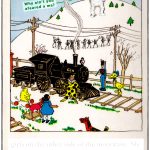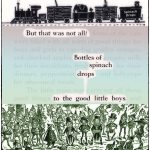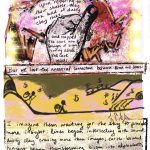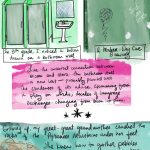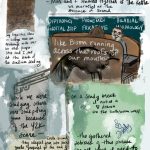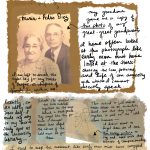You were the one whiteboy who came over to visit a house where usually there were only blackfolk. You were friends with Kevin—my boyfriend—his former co-worker at the nursing home. You extended your hand not to give me dap, or to pull me into a bro hug, or even to change the shape of your hand for a fist bump, but to clasp my palm, as in a transaction.
You didn’t say wassup or what it do, but nice to meet you.
Your name was Riley, and you were tall with dirty blond hair, blue eyes, a chipped tooth, and some might say you were cute.
You drank Natural Light, smoked cigarettes, and weed if it was passed your way.
You were addicted to opioids, but you’d been trying to quit, especially after your girlfriend quit you; she was a CNA where you and Kevin worked, but after dating you a while and you wouldn’t let the pills go, she let you go. You left the nursing home not long after that.
One day, three years later, when I was home on spring break from graduate school in Iowa City, I watched you overdose.
It happened on a Friday afternoon, when you were supposed to be cutting the backyard, even though the sky was gray and steadily darkening with threats of a rainstorm.
I had plans to spend the day with Kevin on the couch binge-watching Netflix, but company kept arriving.
Benita was the first, announcing herself popping her Double Bubble gum.
You came in right after her, pulling a lawnmower behind you like a wagon, holding to the handle with one hand while jostling a can of Natural Light in the other. By the time you made it to the dining room—where Benita and I were sitting—you’d left a trail of beer that foamed on the hardwood floor.
You better clean that shit up before Kevin sees it, Benita said.
You looked back at the spillage and mouthed fuck.
Get the mop dude, she said when you stood there gaping at the mess you’d made. The way she exaggerated the u made it seem as if what she’d really said was: get the mop you dumb, triflin ass, muthafucka. Benita was harsh and, if you didn’t know it already, you got on her nerves. Why didn’t he just take the lawnmower around the side of the house? she said to me after you’d gone into the kitchen. But you didn’t go for a mop, you went for paper towels, which we could hear you tearing off in sheets. The mop, dude, get the mop, she yelled. You wasting paper towels.
You were shrug-shouldered with humiliation when you returned with a mop to clean up the mess. Did you wet it? You gotta wet it, Benita said and watched you slink off to the kitchen again.
At least you had the floor cleaned by the time Kevin came back inside.
You and I would often joke about Kevin’s idea of what constituted clean and orderly—how he liked his place mats arranged on the dining room table with the corners touching so the center of the table was a framed rectangle; how his condiment bottles on the countertop must be in rows by height with labels facing out; how the chairs should be tucked beneath the table when not in use so they weren’t in people’s way when they moved around the room.
Kevin didn’t comment on the wet streaks slowly fading away. He’d decided to put some meat on the grill and went into the spare bedroom where he kept a bag of charcoal in the closet and dragged it through the kitchen to take outdoors. I asked him if it might rain, which was my way of saying don’t cook out because it might rain. Kevin answered by asking me to season the burgers and boneless chicken breasts. I did not season the burgers and boneless chicken breasts.
Terry was the last to show up, talking on his cell phone. I told Kevin to ask him to season the burgers and boneless chicken breasts. Hearing his name, Terry waved me off then secluded himself in the living room, where blackout curtains created a dark alcove for him to hide in, but not to muffle the conversation he was having with his soon-to-be ex-wife, whom he’d recently begun to refer to as his baby mama.
I heard him pop the tab on a tall boy of Bud Ice (the only beer he and Kevin drank) and loudly slurp the spillover. Kevin had told me several times during our nightly, long-distance phone calls how Terry regretted that his marriage was breaking up and he didn’t care anymore that his wife had gotten pregnant with another man’s child. Of course, the fact that he, too, might father a child with another woman may have given him this perspective; he might have rationalized their mutual infidelities as a mutual cancelling out of wrongs: they’d both fucked up so couldn’t they just get past the drama to be parents to the one child they’d created together? He’d be by to pick her up later, I heard him say, and then his voice lowered in pitch, as if he’d cupped a hand around the mouthpiece. Come on, he said, crooning to her like an ’80s balladeer in what he could never deny wasn’t an attempt to please, baby, let me hit that, he said.
You’d taken the lawnmower to the backyard and returned to the dining room with another 12 oz. can of Natural Light. You popped the tab and set the can on the table beside Benita. Without taking a sip, you lingered briefly in the middle of the room and mumbled to yourself, or to Benita or to me, neither of us could tell, then took off again. You returned with a leaf blower, a gas can, which you carried beneath one arm, and another Natural Light. You opened it and placed it this time on the mantel and took the leaf blower and gas can to the backyard. Never once did you sip from either beer.
Benita looked up from a game she’d been playing on her cell phone to watch you leave the room and come back. Her hair, slicked down with grease, was pulled tight into a ponytail that lashed the air each time she whipped her head to follow you back and forth, a snarl stiffening her upper lip like a pinched fold of dough. Her expressiveness portrayed a three-dimensional annoyance that reminded me of the look on people’s faces after they’d made a petty comment about some petty thing.
When she heard Kevin in the kitchen, she went to him to ask what was wrong with you.
Kevin told her you were on one, entering the dining room seasoning a plate of boneless chicken breasts. He set the plate on the table to light a Black & Mild, then continued to lightly dust the meat with seasonings.
Benita asked what you were on.
Through an exhale of smoke, Kevin told her he didn’t know. Probably roxys, he said, two fifteens. He clenched the tip of the plastic filter between his teeth, his right eye cinched tight to avoid the smoke, and let the tip rest in the corner of his mouth.
Two fifteens my ass, Benita said.
As if on cue, you walked in tilting a can of Natural Light. You’d forgotten the other open, untouched cans still in their places on the table, the mantel. You tried to take a sip but missed your mouth when you stumbled, lifting your foot too high, as if you were prepared to step up and had come down thinking a landing was closer than it was, so gravity pulled you forward, which threw you off balance. You pretended to play it off with a bit of footwork you said you’d learned from watching Childish Gambino.
You need to sitdown, dude, Kevin said, laughing.
You fucked up, ain’t you? Benita said simultaneously.
I’m awright, you said, and as if to prove this you shook your arms and legs vigorously in the air. You seemed agitated. Your eyes were wet and tired, the rim of your lower lids puffy, pink like an albino rabbit’s eyes. Your eyes wanted sleep, but your body was fueled, apparently, by thirty milligrams of pills to keep you sleepless. When you disappeared outside again, Benita told Kevin that she heard that you crushed your pills. Kevin said yes, you did, and that you snorted the powder. Benita shook her head, her mouth pursed. She didn’t snort her pills, nor anything else for that matter. Unlike you, she took pills because she had sickle cell anemia. Yes, sometimes, she’d said many time before, when her sickle cell flared up and she could barely get out of bed, she had to call around to see if she could buy extra pills; she needed always to be in constant supply of pills to keep the symptoms of her sickle cell in check.
I gotta get this meat on the grill, Kevin said and grabbed the plate of boneless chicken breasts and headed outside. Terry came in just then and the two of them stopped just short of colliding. My bad, Terry said. He had been in the backyard and came to tell us you just fuckin threw up in the trash can.
Puttin shit up your nose. That’s what happens, Benita said.
Terry said you were outside sweaty and red in the face.
Would you put shit up your nose? Benita asked me.
Nah, I said, to imply hell no! as if I’d never dared to do something like that, ever, not ever had I smoked crack cocaine, nor did I once, when so fucked up, attempt to snort through the lit end of a cigarette. Obviously, Benita had forgotten I’d told her about my past drug use, about those very incidences. I searched her face for the recognition that told me she remembered, but her own eyes were glazed over with what could be either the weariness of being fed up with other people’s shit or this was the settling in of her own high. She tapped a cigarette out of her pack and proceeded to strike a series of sparks with her lighter. Your lighter’s out of fluid, Benita, I told her, but she kept trying.
Who knows why people do what they do, she said, her head beginning to loll.
When I finally went outside, the coals were lit and the grill was smoking. Kevin paced nervously as the skirt of his black bib apron fluttered in the slight breeze, clapping a pair of tongs together like pincers in one hand and taking frequent swigs from his beer with the other. Terry leaned against one of the posts on the small porch, giving me the side-eye when he saw me, shaking his head. It’s not looking too good, he said, nodding toward something past me. I followed his gaze to where you sat in a patio chair a few feet away from the grill. I hadn’t noticed you, but probably because I wasn’t expecting to see you sitting with your legs shoulder-width apart, each of your arms resting along the arms of the chair, your head hanging so your chin barely touched your chest, your mouth languishing partly open with drool stretching a silvery strand down into your lap.
Kevin and Terry alternated turns calling your name. Kevin tilted up your head, only for it to fall forward with a slight bob; he said you needed milk. Terry directed our attention to the dog, Kevin’s pit bull, who circled you in your chair then stopped to lie down. She whined, half-barked, then she was up again, letting loose a high-pitched squeal; she pawed at the dirt and grass, digging with her nails and sending a fretwork of dust into the air that formed a cloud around you.
Kevin came back without any milk but with Benita smoking her cigarette. Oh gawd, she said, her eyes now wide open when she saw you. She said she had to leave because you were fucked up. You were a whiteboy, she said, and if one of us had to call 911, she didn’t want any part in what happened when they got there.
I didn’t pay Benita any attention. I watched you, wondering how many sad clowns were packed inside that tiny car.
Kevin, too, paid Benita no mind because he thought you were just passing out, which was good, he said, because you needed to sleep it off.
I wasn’t so sure. I went inside.
I heard Benita’s thick-heeled boots not soon after, clomping into the dining room where I’d distracted myself on the computer.
Benita stuttered directions for me to look up on the internet the signs of an overdose. I did and listed a few symptoms to her: dilated pupils, severe difficulty or shallow breathing, gurgling sounds, blue lips or fingers, nausea or vomiting, unresponsiveness … a person didn’t need to exhibit all the symptoms to indicate an overdose. Benita rushed outside, yelling to Kevin and Terry: vomiting, something about the pupils, gurgling in the throat, breathing with blue lips …
It had been roughly thirty minutes since you unloaded your car with all the tools you needed to cut Kevin’s backyard, since you danced your way out of a stumble and Kevin and I laughed, since you popped open three cans of beer, two of which you abandoned untouched, and then you suddenly began vomiting in the garbage can and were placed in that chair. But, if you had done so, how long had it been since you snorted those pills?
Benita rushed back through the house gathering her purse and cellphone off the table, and waved goodbye. See ya. Lord willing and the creek don’t rise. I’m going to get my nails done.
I set the laptop aside, feeling uneasy. I needed to see for myself how bad it had gotten for Benita to leave the way she did.
I felt as if I were about to open a door into a past that often haunted me, entering a room to lift a sheet covering a body that lay cold on a slab. Was it me?
I became a visitor in a place I hadn’t been to in a while. Even though I recognized those familiar surroundings, I felt like a stranger, and it was possible that you, too, felt like a stranger inside your own body.
I’m coming, I’m coming was the reluctant way I walked through the rooms to get outdoors.
I heard music that wasn’t playing before as I approached the backyard, smelled mesquite smoke mixed with charred chicken flesh and seasonings that didn’t waft on the subtle breeze before, and, through the window, I saw the opaque clouds billowing from the grill that before was a cloud of dust the dog had kicked up, but this new cloud blocked you from my view.
This was the moment I pretended that I didn’t wait too long to follow my intuition; that I didn’t need to suspect a bad situation even when your slack-jawed mouth drooled with so much silvery, silken strands of spit; that you weren’t propped up like a mannequin to model normalcy; that you weren’t trying to convince us that you were only having a bad trip (but nothing you couldn’t shake off); that this was you just playing possum.
Kevin used his cell phone to record you while he and Terry kept calling your name. But you couldn’t answer them.
Your arms had gone limp, no longer resting on the chair; your hands were likewise motionless between your thighs. You breathed, but your breathing was labored, shallow gasps as if the air inside was trapped so deep inside your chest that when it reached my ears it was the echo of your efforts to breathe that I heard, your lungs taking in breath but sending back the faint noise of rattling cans.
You were in tremors as if from shocks of low-voltage electricity, as if your body was a city of dimming lights from a series of rolling brownouts.
You were shutting down.
Your face was blue with the encroachment of more blue—your lips blue, your cheeks besieged with blue, an armada of blue storming toward the north theater of your face, capillaries carrying the blue until the totality of your face would be subsumed by blue, and Terry and Kevin acted as if they didn’t know whether to continue to barbeque, to wait and see what happened, or to do as I said and fucking call 911.
I couldn’t stop looking at you. I wouldn’t blink; if I didn’t blink, you’d be fine; you’d be fine because I was fine; because I was proof that rock bottom didn’t need to mean death.
I’d come down off the pipe once and struggled through the night shivering, and no amount of blanketing would qualm, and nothing could distract me from believing that as I lay in a bed demonized by crack cocaine, I felt elsewhere the heels of so many people walking back and forth across the future site of my grave.
I had to believe that Terry didn’t want to call 911 because he was a felon who didn’t want cops swarming with their detective work.
Kevin was afraid that he might be wrong about you having a bad trip, and that you were dying while he drank beer, recording you while he made sure the boneless chicken breasts were neither overcooked nor raw in the middle. He was afraid, the way we all were, that this wan’t the movies where the blue in your face was special effects makeup and magic.
We heard sirens coming from of St. Mary’s Hospital, a few blocks away. Within minutes, three paramedics in a fire truck climbed out and, together, walked casually to the backyard.
Back here? one said, pointing.
Yes, back here, I said, swinging my arm like a propeller to rush them.
The first paramedic knelt beside you, took his fist and rubbed circles over your heart. The second asked us your name. When we told him, he asked you if you could hear him. What’d you take today? he asked. Your response carried the same low gurgling you’d been making since Kevin dialed 911. Shaking his head, the paramedic repeated the question.
The third paramedic started an IV and gave your vitals to the second, who wrote them down on his gloved hand. The glove was blue, and I worried the ink wouldn’t show. I came closer when the first paramedic shone his tiny flashlight into your eyes to check your pupils. They were small as pinpoints. The whites of your eyes waxy.
Two cops arrived and immediately began gathering details. The first cop took information from one of the paramedics, while the second spoke with Kevin. He told the cop that you admitted taking two fifteens of roxys, but Kevin believed you took more than that, or you took something else with it. The first paramedic stopped rubbing your chest to interrupt their conversation. He agreed with Kevin, so the cop asked if you were ever in the house. First, Kevin said no, then he backtracked, and said instead that you had been unloading the lawnmower from your truck and started to bring it through the house before he stopped you and asked that you bring the lawnmower around the house to the backyard. I worried he was implicating himself too much because he was so desperate for you not to be in the house in his version of events. He didn’t want to give the cops probable cause to search the house.
Terry had been quiet, shrinking back, his eyes suspiciously watching the cops. He saw me looking for him and when our eyes locked, he mouthed that’s the cop. It took him a few times mouthing and gesturing at the cop for me to understand what he said, but then I understood. Terry had been in a minor car accident just around the corner from Kevin’s house a few weeks earlier. But Terry didn’t have a driver’s license. The cop wrote him a ticket and that seemed to be the end of it. But seeing him now, at the house, was too much of a coincidence. It incited a nervous fear within Terry that showed on his face.
I walked over to tell Terry I didn’t think the cop recognized him. He was too busy explaining to Kevin how people would sometimes ask to use the bathroom so they could take drugs. That’s why he wanted to know if you were in the house. He needed a timeline of events. But everyone’s conversations were put on hold when suddenly you leaned forward so abruptly in your chair you nearly fell out of it. Two of the paramedics had to catch you and press you back into the chair. Easy, easy Riley, they said.
You shook your head, looked around to familiarize yourself, and as if none of this ever happened, responding to a barrage of questions, you verified your name, spelled your last name that had earlier given Kevin trouble; you gave your address, and, finally, because you were cold you asked for a blanket.
In a minute, a paramedic said.
Curiously, though, no one asked you what you’d taken. They loaded you onto a gurney with a blue blanket. You wrapped it around yourself, including your head. Your muffled voice asked what hospital they were taking you to.
It’s wherever you want to go, a paramedic said.
You said St. Mary’s since it was closest to your house.
As they wheeled you away, Kevin closed the lid on the grill to suffocate the still red-hot coals. I took the chair you sat in and stacked it with the others. A smear of blood on the armrest had to be wiped away. Terry wanted to leave but was afraid to get in his car and drive home. Across the street, where you’d parked your car, the two original police officers were joined by two more squad cars and a K-9 unit. It had grown dark by then. Flashlights lit the interior of your car while a German shepherd was taken by the leash to sniff around and eventually inside your vehicle. They had your car keys, I’d forgotten. After you were taken away, Kevin found them, which must have fallen from your pocket at some point, hidden in the high grass. One of the police officers asked to take them.
You came back to the house a few hours later. Kevin and I were playing a game of spades with some friends—the JJs, Jay and Jalisa—who arrived shortly after the cops had put away their flashlights and left. Kevin showed them the video he’d taken of you earlier in the chair. Jalisa had been rolling a blunt and Jay smoking a cigarette, and both of them watched with their mouths agape at the blue, drooling face gurgling ceaselessly before the camera.
As they watched the video, I replayed that sudden intake of breath that brought you back to seemingly full vitality. Narcan, I was told, was what the paramedic administered through the IV. They said it took about two minutes to revive you. Two more minutes without it, you might have been dead.
You had come back to ask Kevin to let you keep your lawn equipment in his backyard, to tell him privately that you’d taken heroin earlier that day, and to thank him for calling 911. Kevin must have told you I was the one who told him to. You said thank you, Darius, on your way out, avoiding my eyes, though you briefly squeezed my shoulder. Kevin walked you to the door and returned quickly to the table to deal the cards for another hand. We beat the JJs that night, but probably because they’d gotten too high smoking the blunt to pay attention.


